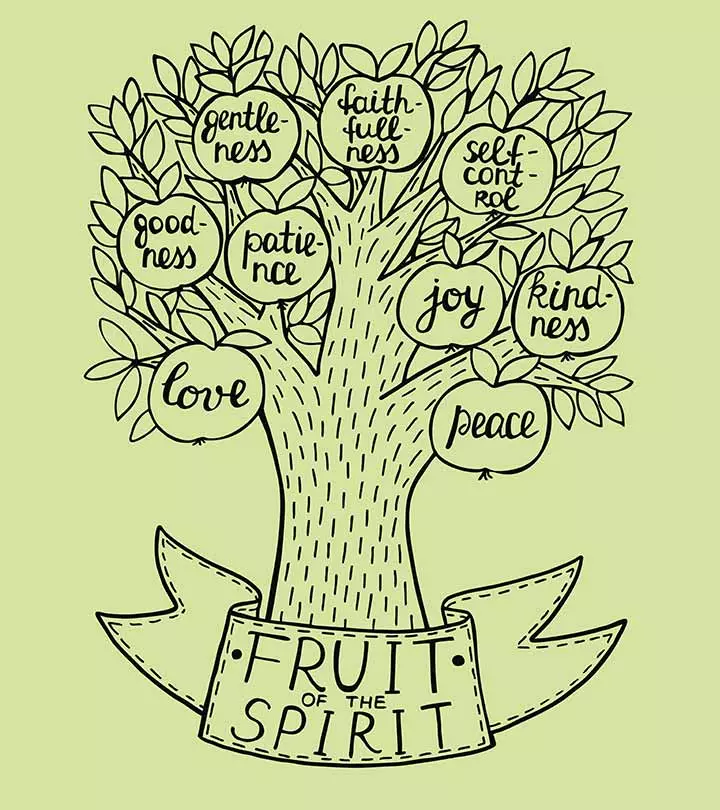
Image: Shutterstock
Explaining the fruit of the spirit for kids ensures they follow the values of Christianity all through their lives. Parents need to make their children understand what it is and its significance in the formative years itself for a productive, happy, and content life. Also, following the teachings of Christianity helps them practice good qualities and evolve spiritually. We bring you this post to help you explain the nine attributes or fruits to your children to have a joyful life ahead.
Key Pointers
- Fruit of spirits in Christianity comprises certain important virtues for a content life.
- Educate your child about the nine fruits of spirits to help them imbibe and practice these qualities regularly.
- Encouraging your child to practice attributes of love, self-control, kindness, and more such qualities will help them become good individuals.
What Is The Purpose Of The Fruit Of The Spirit?
The term ‘fruit of the Spirit’ is found in Galatians 5:22-23, where Paul talks about how different life is and how better life could be when lived following the Holy Spirit. The following are the exact verses:“
But the fruit of the Spirit is love, joy, peace, patience, kindness, goodness, faithfulness, gentleness, self-control; against such things, there is no law.” The nine fruits of the Spirit are:
- Love
Jesus is the best example of God’s love for us. As John 3:16 says, “God so loved the world that he gave his only Son, so that everyone who believes in him won’t perish but will have eternal life.”
Since God loves us so dearly, we should also love each other as 1 Peter 4:8 in the Bible says, “Above all, keep loving one another earnestly, since love covers a multitude of sins.”
- Patience
Being patient means waiting calmly and without complaining just as Job did. He lost his family, his health, and everything he had. But he trusted God and in the end, God blessed him even more. The Bible says in Ephesians 4:2, “Be completely humble and gentle; be patient, bearing with one another in love.”
- Joy
God gives us His joy even when we feel everything is going bad. He feels our lives with hope just as he did for Paul and Silas, even when they were in prison, as stated in Acts 16:25. The Bible says in Nehemiah 8:10, “The joy of the Lord is your strength.”
Courtney Dimmit, a blogger and a mother to a son, shares an interesting activity she used to teach her son about the Fruit of the Spirit- Joy. She shares, “For this particular lesson, you’ll need a glass, enough marbles to fill it, a water dropper (or spoon, straw, whatever you want to use), and probably a plate or towel. I placed the empty glass on the plate and asked Little Man to start naming things that make him happy. He said things like Minecraft, our puppies, playing Legos, pancakes, pizza, dessert, and video games. Each time he said something, I poured a dropper-full of water into the glass. “Those things can make us really happy, huh? They’re really fun! But look at the glass. Is it full?” No. The water never reached the top.
Then I asked him to start telling me things that God gave us and things that bring us closer to Jesus. He said things like family, the sunshine, going to church, reading our Bibles, singing songs. Each time he said something, I dropped a marble into the water. “Wow! Look at how full the glass is?! What do you think is going to happen?”
We finished the lesson by reciting our memory verse and dropping a marble as we said each word. “But the Fruit of the Spirit is love, joy, peace, patience, kindness, goodness, faithfulness, gentleness, and self-control. Against such things there is no law.” “Look! The water just overflowed out of the glass! God fills us with joy just like that! When we find our joy in Jesus, we will overflow and can spread that joy to others (i)!”
- Peace
Whether due to study or family and friends, our hearts are always troubled, but coming to God and praying to him can give us peace. In Mark 4:39, Jesus even calmed the storm in the sea. Jesus and his disciples were in the boat and there was a huge storm. But as soon as they turned to Jesus for help, he calmed the sea with his word, “Peace! Be still!”
- Kindness
The Bible constantly tells us to be kind to others and help them in their needs, as Ephesians 4:32 says, “Be kind and compassionate to one another.” One of the great parables that Jesus shares with his disciples to teach about kindness is ‘Good Samaritan (Luke 10:30-37).’ The Samaritan helped an injured stranger when everyone else ignored him. He showed him kindness by taking care of him.
- Goodness
Joseph, the son of Jacob, is one of the best examples of a man with a good character (Genesis 50:1-2). Even though Joseph’s brothers sold him as an enslaved person, he forgave them and helped them during a famine. He chose to do good instead of seeking revenge.
Sometimes, we do good when people are watching but what if no one is watching? Goodness is doing the right thing and making good choices, even when no one is watching.
- Faithfulness
Being faithful means being trustworthy and always fulfilling your promises. We should also be loyal to God just like Daniel. Even when Daniel was in a foreign land, and it was against the King’s law to pray to another God than the King, he remained faithful to God by praying as Daniel 6:10 describes.
- Gentleness
A person with a gentle nature is always careful with their words and actions and treats others with care. Jesus always showed his loving nature and gentleness towards others, especially children. When disciples tried to stop children from coming to Jesus, He gently welcomed them and blessed them as Matthew 19:14 says. He said to them, “Let the little children come to me, and do not hinder them, for the kingdom of heaven belongs to such as these.”
- Self-control
Self-control is when you stop yourself from doing something you shouldn’t, even when no one is looking. As Matthew chapter 4 states, when Satan took Jesus to the wilderness where he was being fasted for 40 days and nights, Satan tempted Him to turn stones into bread, but Jesus did not agree to any of the temptations and showed perfect self-control.
These verses help us better understand who God is and show us what our lives look like when the Holy Spirit plays an active role. The benefits of learning about these fruits extend beyond ourselves to those around us.
The nine qualities listed in the ‘Fruit of the Spirit’ verses help us improve various facets of our lives, transforming us into better spiritual beings rather than remaining purely physical. In doing so, we learn to distance ourselves from materialistic wants and desires, opening our hearts and souls to God’s love, which fills us with everlasting joy.
It is also important to note that when Paul speaks of the ‘Fruit of the Spirit,’ he emphasizes that one should embody all these attributes, not just one or two.
As Dr. Dave Ralston, the founder and counselor at Life Training Christian Counseling, says, “What Paul is helping us see is that if the Spirit is truly in us, then we should see the evidence through the presence of the entirety of the ‘fruit,’ which is described by love, joy, peace, patience, kindness, goodness, faithfulness, gentleness, and self-control. Not one or two characteristics, but all of them (1).”
How Should You Explain The Fruit Of The Spirit To Kids?
It is vital for children to memorize the verses and put them into practice in their everyday lives.
When the child does not understand what they stand to achieve when they follow a guideline, they are not motivated to follow it. Hence, it is important to explain the purpose of the fruit of the Spirit in ways that they can understand and follow.
Typically, when you look at a Bible class that teaches these concepts, teachers may use music, cards, or other extra resources, such as actual fruits, to discuss these nine qualities.
While it is important for children to learn and memorize the nine qualities, a hands-on approach works wonders in teaching them how to apply these in their lives.
Here are a few simple ideas you can use to teach the fruit of the Spirit to your children effectively.
1. Show it in action
The best way to teach a child something is to show them how it is done. This holds good for the fruit of the Spirit lessons too.
For example, love is one of the fruits of the Spirit mentioned in the verses. Explain to your child how you love them and they love you back and how it makes you both feel happy. Tell them how this feeling must not be restricted to just family but everyone around them as well, including creatures of every kind.
Maybe you can try petting a dog and let your child see how the animal reacts to the loving gesture. You can also explain to them how God loves them unconditionally and is most pleased when they show the same kind of love to everyone and everything around them.
Making a ‘fruit of the Spirit chart’ is another way to encourage kids to practice vital values. An anonymous blogger and mother of four shares, “A fruit of the spirit chart is a nice way to introduce these words (acts of love and good works). I used this with my first two children. When we did the chart, they got fruits to put on it when we saw it in their actions. Once a row is filled up, they’ll get a reward. Maybe a few chocolate chips. Maybe a new book. What’s beautiful is that when I look for ways to reward my child’s character, I am amazed at how kind and thoughtful these special little people are (ii).”
 Quick tip
Quick tip2. Reiterate it

A lesson stays in mind when it is reiterated and reinforced. With the fruit of the Spirit qualities, the child learns how to implement these fruits in life when they see them applied in various situations. This helps cement the idea in their minds and teaches them how to display these qualities in all aspects of their lives.
For example, patience is a trait that helps us handle stressful situations in life. You can teach them how patiently waiting until Christmas to break open their piggy bank ensures they have saved enough money to buy themselves a bigger present than they could have at the beginning of the year.
3. Help them practice it
Children may come across plenty of situations to practice these qualities in their everyday lives. Therefore, teach them early. Then, they can leverage every such opportunity to practice and show one or many of the important qualities in the situation.
For example, you can demonstrate faithfulness by talking to them about how we expect our family and friends to stick with us through thick and thin, regardless of the situation. Help them see how they rely upon faithful friends and trust them. Teach them to be faithful to everyone and introduce them to the idea of being faithful to Christ and following his teachings regardless of whether anyone’s supervising their actions. Teach them goodness by showing generosity and compassion towards those less fortunate than them.
4. Make it a part of your life

These fruits must become a part of your life so that the child can learn by watching the family practice these values every day. Make sure to point out to the little one how you display these qualities in every walk of life. It is also vital to help your child understand why you are doing so.
Sharing his opinion about the ‘Fruits of the Spirit,’ Dr. Sinclair B. Ferguson, a teaching fellow, vice-chairman of Ligonier Ministries, and Chancellor’s Professor of Systematic Theology at Reformed Theological Seminary, says, “It isn’t a matter of just trying to do the right thing, trying to be this or trying to be that. It’s much more organic. It’s this ninefold Fruit of the Spirit, which the Spirit produces in us as we grow in our love for the Lord Jesus, as our hearts and minds and our wills submit to Scripture, as our affections are suffused with the teaching of Scripture and the knowledge of the Lord Jesus. Then there is a kind of spiritual natural way in which we grow to be more like Him. And at the end of the day, that’s what these fruits of the Spirit add up to: likeness to the Lord Jesus (2).”
For example, teach them about gentleness as you comfort them when they come to you with a cut or bruise. Talk to them about how a gentle touch can be soothing to someone who is upset or scared and how it can help alleviate the suffering of another. Talk about the soothing power that even a simple touch has. Talk to them about how forgiveness can lighten their mind and help them move forward.
5. Teach them through pretend play
One of the most interesting pastimes of children is acting out various scenarios of life. Create a scene where you can demonstrate one or more fruits of the Spirit at once and explain to the child why it is important to act in a particular way. You can even pick some stories from the Bible and enact them.
For example, the concept of joy can be elusive to a child, but you can show them how not to lose inner joy no matter what the situation is through pretend play. Create a scene with two characters, both facing adversity. One allows the adversity to affect them deeply and loses their peace. The other holds on to their inner joy and thus breezes through the bad situation, emerging from it unscathed and unaffected. Teach your child how the inner joy that originates from faith in the Lord cannot be eroded no matter what difficulties come our way. You can also use pretend play to teach values like honesty and responsibility.
6. Use stories to communicate

Stories can be a powerful medium when introducing important life lessons to kids. Use stories that underline the qualities that you want your child to imbibe. You can pick out their favorite characters to use in your stories and explain what you mean.
For example, superhero cartoons or movies may offer great opportunities to explain what you mean by peace and how peace can help resolve conflict in the best way. Tell your child how violent reactions or strong emotions mess up matters for them in delicate situations by showing how their favorite characters handle such issues calmly and peacefully. Teach them how God, who wields unlimited powers, believes only in peaceful action even while addressing violence. You can also teach other values like gratitude and humility through stories.
7. Create opportunities
You may come up with real-life scenarios for the child to put these qualities into practice. Then, while they are at it, you can guide and help them correct their actions.
For example, use kindness activities for kids, such as visiting the closest nursing home or shelter for the homeless, and make it a family tradition. You may celebrate birthdays or anniversaries or donate something for such people. The child can experience firsthand how a small gesture of selflessness or a kind word can bring joy and contentment to everyone. Tell them about how showing kindness and mercy to all lets us respect every creation of God.
8. Correct them
Children will make mistakes as they grow and encounter people and come across various situations. When they make a mistake, you may teach them the value of the fruit of the Spirit instead of merely rebuking them. Talk to them about which of these qualities they should have exhibited and how it would have helped in the situation.
For example, if they get into a fight at school that ends in fisticuffs, you can explain to the child how self-control in such a situation could have safeguarded them and also the other person, even if the latter did not hold back. Teach them how it takes great power, purity of mind, graciousness, and inner strength to be in control of a tough situation.
 Do remember
Do remember9. Appreciate them for good work

A lesson for children always works better and stays in the mind when they get appreciation. When they do something good, appreciate them and explain how they have displayed one of the fruits of the Spirit. Tell them how demonstrating these qualities has a ripple effect, prompting others to do the same, thus creating a society filled with positive people. When you encourage positive behavior in children, they bloom into beautiful adults.
For example, you can appreciate your child’s goodness when they help someone carry grocery bags to the car or volunteer to help a fellow student with homework. Good deeds should be celebrated, and they should be commended. Talk about how God has been good to you and your family and how you say thanks for it by being good to others.
Frequently Asked Questions
1. Why is the fruit of the Spirit important?
Learning and accepting the meaning behind the fruit of the Spirit can help live a kind and contented life. If one practices the nine lessons related to the fruit of the Spirit, they become helpful, composed, and gentle individuals while drawing near to God.
2. What does Scripture talk about the fruit of the Spirit?
The Scripture talks about the nine traits or characteristics of the Holy Spirit that we ought to incorporate into our lives. Hence, we should try to become more like Him by being kind, loving, and self-controlled along with the other manifestations (3).
3. What is the difference between the gifts of the Spirit and the fruits of the Spirit?
According to the Bible, the gifts of the Spirit are the special abilities granted to individuals by the Holy Spirit. On the other hand, the fruits of the Spirit are the nine virtues that help make one’s life better.
4. How can children learn to recognize and appreciate the fruits of the Spirit in others?
Model the behavior of the fruits of the Spirit, explaining its impact on self and others. Read Bible stories and discuss actions reflecting these values. Use inspiring stories from the media to teach your children about the fruits of the Spirit. Practice empathy and kindness and express gratitude for your life’s positive things. Through consistently emphasizing these virtues, your children will learn to appreciate them.
5. What Bible verses relate to the fruits of the Spirit?
Galatians 5:22-23 and 1 Corinthians 13 are among the verses that could encourage your child to practice the fruits of the Spirit daily.
6. How do we bear the fruit of the Spirit?
When we have a deep connection with God, are willing to follow in His footsteps, and surrender to His will, we can bear the fruit of the Spirit. Seek to transform yourself to reflect the best side of your personality and regularly practice these virtues. Following on the path of patience and kindness with faith in God will help you exhibit and bear the fruit of the Spirit in your daily life.
The Holy Spirit is a guiding force for people. The fruit of the spirit is love, patience, joy, peace, kindness, goodness, faithfulness, gentleness, and self-control. These qualities help in the overall and holistic development of a child in all aspects of life. Children should be taught these values in a language that they understand. The fruit of the spirit for kids gives them wisdom and lays out a road map for life to them. The lessons should be illustrated with examples so the children can learn how to implement them in life.
Infographic: What Does the Bible Teach About Different Fruits Of Spirit?
Teaching your children about ‘Fruits of Spirit’ is important as it will help them grow both spiritually and morally. It is also essential to let your children know the Biblical meaning of these fruits. Share this infographic on some Bible verses corresponding to these ‘Fruits of the Spirit’ with your children and enlighten them. Illustration: Momjunction Design Team
Singing along to this lively and engaging song about the Fruit of the Spirit will provide a joyful and captivating preschool worship experience.
Personal Experience: Source
MomJunction articles include first-hand experiences to provide you with better insights through real-life narratives. Here are the sources of personal accounts referenced in this article.
i. 10 Days in the Fruits of the Spirit ~ Day 3 {Joy};https://mommyandhermen.blogspot.com/2015/08/10-days-in-fruits-of-spirit-day-3-joy.html
ii. Fruit of the spirit chart;
https://teachinglittleoneshisword.wordpress.com/2014/06/09/fruit-of-the-spirit-chart/
References
- The Fruit Of The Spirit Is Singular.
https://lifetrainingcounseling.org/the-fruit-of-the-spirit-is-singular/ - The Fruit of the Spirit.
https://learn.ligonier.org/podcasts/things-unseen-with-sinclair-ferguson/the-fruit-of-the-spirit-things-unseen - What does the Bible say about the fruit of the Spirit?
https://www.denisonforum.org/resources/what-does-the-bible-say-about-the-fruit-of-the-spirit/
Community Experiences
Join the conversation and become a part of our nurturing community! Share your stories, experiences, and insights to connect with fellow parents.
Read full bio of Emily Louis
Read full bio of Bharathi V
Read full bio of Harshita Makvana
Read full bio of Angela Alex

















